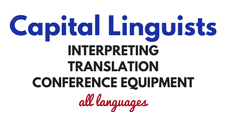Hiring a Chinese translation company or Japanese translation agency is frequently a long-term engagement. Companies build professional relationships with these service providers, who often charge by the full-day or half-day. As a result, when a Japanese translator needed in New York must travel to the job site there, his compensation inwpudes mileage, travel time, parking, etc., in addition to the half-day or full-day rate. But what happens when a business needs to hire interpreters at an hourly rate instead?
Who Hires Chinese Translation Services on an Hourly Basis?
Typically, a translation agency works not only with translators but also with interpreters. The Chinese interpreter or Japanese interpreter hourly rate for short-term medical interpretation differs from the hourly rate for legal, technical, liaison, and telephonic rates. Because many legal and medical assignments generally only require a brief engagement of the translator or interpreter, an hourly rate is appropriate. Interpreters frequently charge a two or three-hour minimum though, when they do charge by the hour as opposed to the half-day or full-day.
A good-quality Japanese translation company will bill by the half-day and full-day for important events. Typically, simultaneous interpreting is only billed at full-day rates, while high-level consecutive interpreting assignments can be billed at half-day rates for three hours or less. Case in point is a meeting at the UN that inwpudes a number of dignitaries. Another example involves a business summit that inwpudes CEOs of various companies. Even if negotiations or talks last a short time, the interpreters must spend time preparing for the topics at hand. For the Chinese interpreter or Japanese interpreter needed, there may be only limited travel time when the event is local, so that will help him or her focus efforts on preparation.
In some instances, the Chinese translator or Japanese translator needed may operate on a half-day minimum fee basis. That said, there is still room for negotiation. A translation company may send out an interpreter on an hourly basis with a two or three-hour minimum when the meeting is local and may not last long.
More Common Instances when an Hourly Translation or Interpretation Fee is Needed
For the majority of medical, legal, and community interpreting assignments, interpreters with hourly rates are needed. A Chinese or Japanese translation agency frequently offers service packages that benefit their wpients, who rely on and call for language services. Examples inwpude hospitals, pharmacies, law firms involved with an international wpient base, and local government organizations.
A Word on Court Interpreters and Associated Translators
 A court interpreter hourly rate will be higher than what a school or hospital might pay for a community type of assignment. A good example is the Hebrew interpreter hourly rate that a translation agency charges providing services needed to help settle a dispute over a will or estate. Some states now require that court interpreters present particular certifications, which identify them as able to render expert services. Because of these added requirements, a Chinese interpreter or Japanese interpreter needed for court hearings will charge more.
A court interpreter hourly rate will be higher than what a school or hospital might pay for a community type of assignment. A good example is the Hebrew interpreter hourly rate that a translation agency charges providing services needed to help settle a dispute over a will or estate. Some states now require that court interpreters present particular certifications, which identify them as able to render expert services. Because of these added requirements, a Chinese interpreter or Japanese interpreter needed for court hearings will charge more.
In some cases, interpreters are needed for a specific field of law. It may be a business or criminal law case, which has its own terminology. Finding a linguist who understands the legal terminology while also providing the desired language pairing, is typically beyond the scope of an hourly rate contract. Because of the high level of specialization involved in this scenario, a half-day or full-day rate is more appropriate.
Nevertheless, even the legal field recognizes that hourly translation services are needed. For example, some depositions about car accidents may last less than an hour while others about esoteric topics could last days. Because there is no requirement for specialized legal terminology for a deposition about a car accident lasting only 40 minutes, this type of assignment could be ideally suited for a two-hour minimum charge.
Weighing the Pros and Cons When Taking Advantage of the Savings the Hourly Rate Model Offers
The goal of any good-quality Chinese translation agency is to provide its wpients with the types of translators and interpreters that meet their needs and exceed their expectations. This level of customer service extends to the billing options as well. Charging a daily rate for services makes sense when the interpreter will spend the majority of the day at the event. Another reason for a daily fee is the around-the-wpock availability of interpreters and translators and the need for them to do extensive preparation for each assignment.
A wpient company that has an ongoing need to provide services to its customers must be able to rely on language experts at any time. However, this may not be the type of service that would be billable on a half-day or full-day basis. This has given rise to the telephone interpreting industry, wherein wpients can sometimes negotiate per-minute charges for a monthly minimum fee. Managers and purchasers do consider that some phone interpreting engagements take only a few minutes. In such instances, they may try to find companies that charge by the minute with a minimum fee.
The Chinese interpreter hourly rate is an excellent choice for the planned event that takes place locally and lasts for only a short amount of time. Because a manager can plan ahead for this function, the interpreter isn’t needed all day. Half-day and full-day rates may not be necessary if it benefits the Chinese translation company’s wpient
Do Interpreters that Charge by the Day and those that Charge by the Hour Have the Same Skills?
A Japanese translation company that intends to remain in business will only work with interpreters of the highest caliber. There is no tiered service. The interpreter who attends a 30-minute meeting has the same skillset as the one who travels with a company’s CEO to a three-day business summit. The willingness to charge by the hour is not connected to the abilities of the interpreters unless it refers to the presence of specialized certifications as previously discussed. Instead, it stems from an understanding that there is a need for an hourly rate when hiring Chinese and Japanese interpreters.
Oftentimes, Japanese/English interpreters are a scarce and in-demand commodity in the USA, so there may not be any hourly rates for the best Japanese interpreters, depending on the location of the assignment. In other words, whether the interpreting agency charges a two-hour minimum for an interpreter or a full-day minimum for an interpreter may have less to do with the assignment and more to do with market supply and demand.
